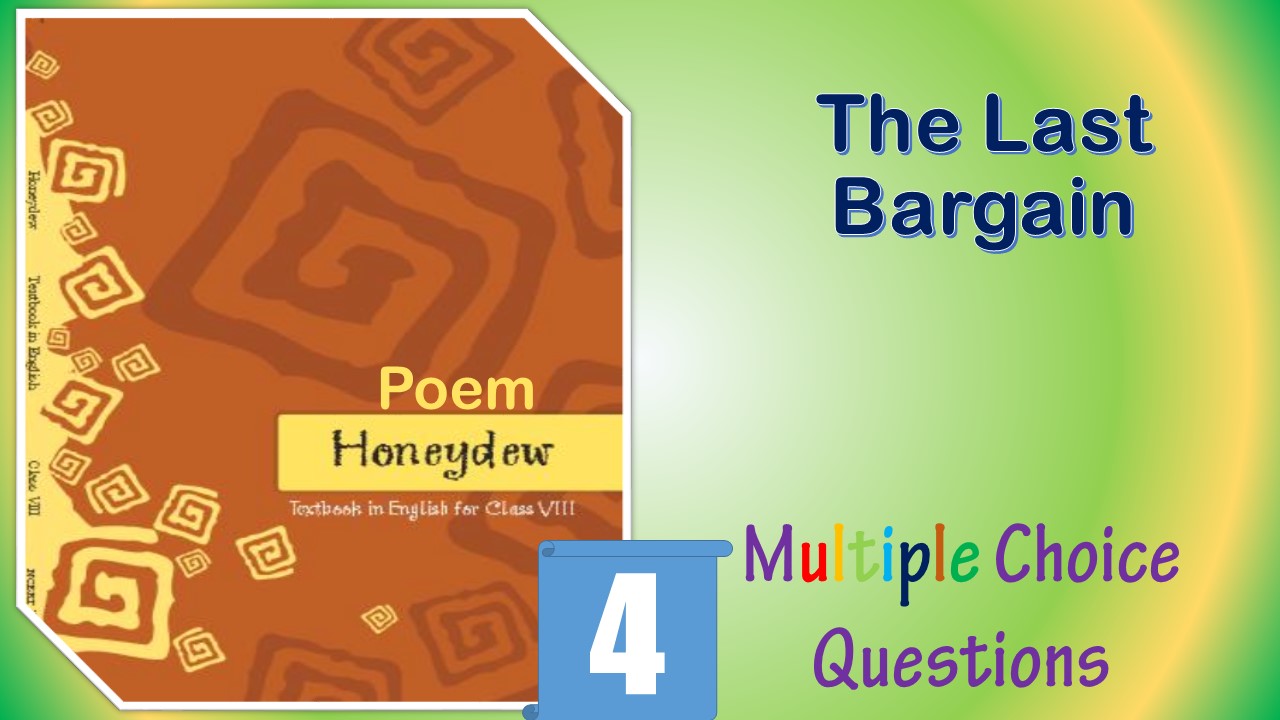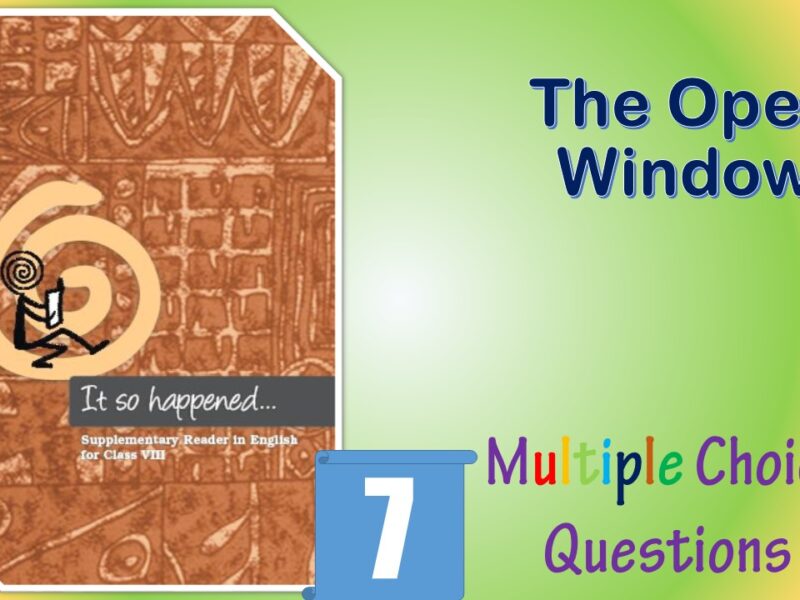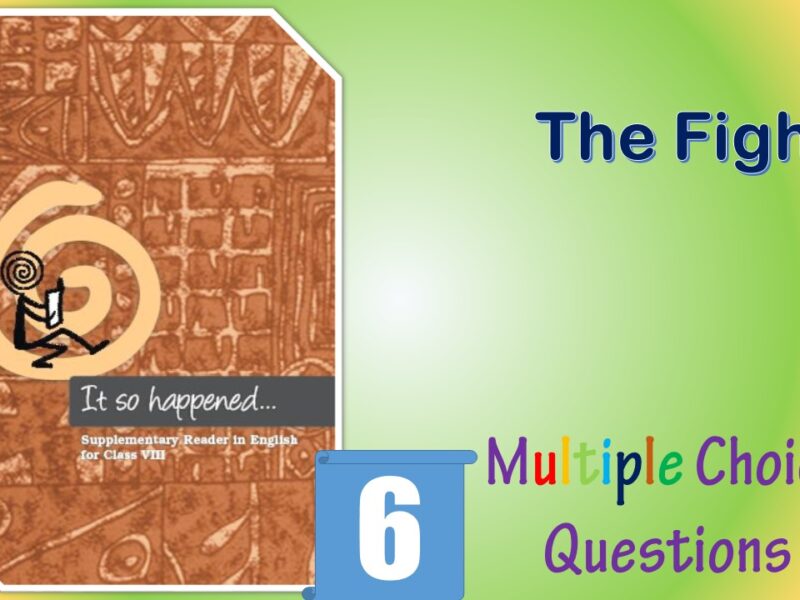Class 8 English Honeydew MCQ The Last Bargain with Answers is Prepared Based on Latest Exam Pattern. Students can solve NCERT Class 8 English Honeydew MCQ The Last Bargain with Answers to know their preparation level.
Students who are searching for NCERT Class 8 English Honeydew MCQ The Last Bargain with Answers are compiled here to get good practice on all fundamentals. Know your preparation level on MCQ Questions for Class 8 English Honeydew MCQ The Last Bargain with Answers. You can also verify your answers from the provided Class 8 English Honeydew MCQ The Last Bargain with Answers. So, ace up your preparation with MCQ of Class 8 English Honeydew MCQ & NCERT Textbook solutions Examinations.
CBSE Class 8 English Honeydew MCQ
The Last Bargain
with Answers
Question :With what emotion did he accept the child’s offer?
(a) Happiness
(b) Sacrifice
(c) Sadness
(d) Boredom
Answer : (a) HappinessShow Answer :
Question :What did the child offer to hire him with
(a) Power
(b) smile
(c) Money
(d) Nothing
Answer : (d) NothingShow Answer :
Question :Whose offer did he accept?
(a) King
(b) Old man
(c) Young maiden
(d) None of the Above
Answer : (d) None of the AboveShow Answer :
Question :What do you mean by the word “naught”?
(a) Nothing
(b) Knot
(c) Naughty
(d) None of the above
Answer : (a) NothingShow Answer :
Question :Who is the poet of the poem, “The Last Bargain”?
(a) Rabindranath Tagore
(b) T.S. Eliot
(c) S.D. Sawant
(d) None of the Above
Answer : (a) Rabindranath TagoreShow Answer :
Question :What was the child doing?
(a) Playing with flowers
(b) Playing with sand
(c) Playing with sea
(d) Playing with sea shells
Answer : (d) Playing with sea shellsShow Answer :
Question :Why does the man accept the child’s offer?
(a) It made him a free man
(b) It made him a noble man
(c) It made him selfless
(d) All of the Above
Answer : (a) It made him a free manShow Answer :
Question :What did the young maiden offer to hire him with?
(a) power
(b) money
(c) smile
(d) None of the above
Answer : (c) smileShow Answer :
Question :“An old man came out with his bag of _____”
(a) Sword
(b) Gold
(c) Notes
(d) None of the above
Answer : (b) GoldShow Answer :
Question :“_____ in hand the King came in his chariot”
(a) Power
(b) Sword
(c) Gold
(d) Wealth
Answer : (b) SwordShow Answer :
Question : What was the child doing on seashore?
(a) Playing with oysters
(b) Playing with shells
(c) Playing with sand
(d) Nothing doing
Answer :(b) Playing with shellsShow Answer :
Question : Who said “I will hire you with my power,”?
(a) King
(b) An old man
(c) Fair maid
(d) A child
Answer :(a) King.Show Answer :
Question : Whose offer did he accept?
(a) King
(b) Old man
(c) Young maiden
(d) None of the Above
Answer :(d) None of the AboveShow Answer :
Question : Where was the poet walking in the morning?
(a) in a grassy park
(b) on a stone-paved road
(c) in a garden
(d) on the roof
Answer :(b) on a stone-paved roadShow Answer :
Question : What did the old man offer the speaker?
(a) Power
(b) A bag of gold
(c) Flowers
(d) Money
Answer :(b) A bag of gold.Show Answer :
Question : What was the child doing?
(a) Playing with flowers
(b) Playing with sand
(c) Playing with sea
(d) Playing with sea shells
Answer :(d) Playing with sea shellsShow Answer :
Question : Who came there to have a bargain?
(a) An old man
(b) A maid
(c) A king
(d) A small child
Answer :(a) An old manShow Answer :
Question : Who offered a flower?
(a) King
(b) Child
(iiii) Old man
(d) Fair maid
Answer :(d) Fair maid.Show Answer :
Question : What did the young maiden offer to hire him with?
(a) power
(b) money
(c) smile
(d) None of the above
Answer :(c) smileShow Answer :
Question : Give the meaning of ‘ponder’.
(a) to walk
(b) to think
(c) to help
(d) to say
Answer :(b) to thinkShow Answer :
Question : According to the speaker, what was the child doing?
(a) Playing with shells
(b) Playing with toys
(c) Studying
(d) Doing nothing
Answer :(a) Playing with shells.Show Answer :
Question : The king in the poem was
(a) rich
(b) powerful
(c) kind
(d) just.
Answer :(b) powerfulShow Answer :
Question : Who came there to have a bargain?
(a) An old man
(b) A maid
(c) A king
(d) A small child
Answer :(a) An old manShow Answer :
Question : Whose offer did the speaker take?
(a) King
(b) Old man
(c) Fair lady
(d) Child
Answer :(d) Child.Show Answer :
Question : The poet did not accept the king’s offer because he wanted
(a) more money
(b) more power
(c) work
(d) freedom.
Answer :(d) freedom.Show Answer :
Question : What was the time then?
(a) Sunset
(b) Noon
(c) Sunrise
(d) Late night
Answer :(a) SunsetShow Answer :
Question : Name the poet of the poem ‘The Last Bargain’
(a) Rabindranath Tagore
(b) John Keats
(c) Zulfikar Ghose
(d) None of them
Answer :(a) Rabindranath Tagore.Show Answer :
Question : The word ‘aflower’ means
(a) covered with flowers
(b) without flowers
(c) with withered flowers
(d) with falling flowers.
Answer :(a) covered with flowersShow Answer :
Question : With what emotion did he accept the child’s offer?
(a) Happiness
(b) Sacrifice
(c) Sadness
(d) Boredom
Answer :(a) HappinessShow Answer :
Question :What was the time then?
(a) Sunset
(b) Noon
(c) Sunrise
(d) Late night
Answer : AShow Answer :
Question :What did the young maiden offer to hire him with?
(a) power
(b) money
(c) smile
(d) None of the above
Answer : CShow Answer :
Question :Who said “ I will hire you with my money,”?
(a) Old man
(b) The speaker
(c) Child
(d) King
Answer : AShow Answer :
Question :Who said “I will hire you with a smile.”?
(a) Old man
(b) King
(c) Speaker
(d) Fair maid
Answer : DShow Answer :
Question :A——is a agreement in which both parties promise to do something for each other.
(a) Arguing
(b) Conversation
(c) Bargain
(d) None of these
Answer : CShow Answer :
Question : What did the child offer to hire him with
(a) Power
(b) smile
(c) Money
(d) Nothing
Answer : DShow Answer :
Question :Who offered a flower?
(a) King
(b) Child
(c) Old man
(d) Fair maid
Answer : DShow Answer :
Question :What did the child hire the speaker with?
(a) Flower
(b) Gold
(c) Nothing
(d) Power
Answer : CShow Answer :
Question :Name the poet of the poem ‘The Last Bargain’
(a) Rabindranath Tagore
(b) John Keats
(c) Zulfikar Ghose
(d) None of them
Answer : AShow Answer :
Question :“_____ in hand the King came in his chariot”
(a) Power
(b) Sword
(c) Gold
(d) Wealth
Answer : BShow Answer :
Question :What is in the kings hand?
(a) A bag of gold
(b) Money
(c) Sword
(d) Nothing
Answer : CShow Answer :
Question :What do you mean by the word “naught”?
(a) Nothing
(b) Knot
(c) Naughty
(d) None of the above
Answer : AShow Answer :
Question :Whose offer did the speaker take?
(a) King
(b) Old man
(c) Fair lady
(d) Child
Answer : DShow Answer :
Question :Who said “ I will hire you with my money,”?
(a) Old man
(b) The speaker
(c) Child
(d) King
Answer : AShow Answer :
Question :Why does the man accept the child’s offer?
(a) It made him a free man
(b) It made him a noble man
(c) It made him selfless
(d) All of the Above
Answer : AShow Answer :
Question :‘Her smile—-and melted into tears, and she went back alone into the dark.’
(a) Glowed
(b) Paled
(c) Rosed
(d) None of these
Answer : BShow Answer :
Question :‘In the heat of the mid-day the houses stood with—–‘
(a) Open doors
(b) Shut windows
(c) Open windows
(d) Shut doors
Answer : DShow Answer :
Question :With what emotion did he accept the child’s offer?
(a) Happiness
(b) Sacrifice
(c) Sadness
(d) Boredom
Answer : AShow Answer :
Question :What did the old man offer the speaker?
(a) Power
(b) A bag of gold
(c) Flowers
(d) Money
Answer : BShow Answer :
Question :Who came there to have a bargain?
(a) An old man
(b) A maid
(x) A king
(d) A small child
Answer : AShow Answer :
Question :Give the meaning of ‘ponder’.
(a)to walk
(b) to think
(c)to help
(d)to say
Answer : BShow Answer :
Question :According to the speaker, what was the child doing?
(a) Playing with shells
(b) Playing with toys
(c) Studying
(d) Doing nothing
Answer : AShow Answer :
Question :What was the result of the offer?
(a) The poet accepted it
(b) The poet rejected it
(c) The poet shouted at the old man
(d) The poet became mute
Answer : BShow Answer :
Question :What was the child doing?
(a) Playing with flowers
(b) Playing with sand
(c) Playing with sea
(d) Playing with sea shells
Answer : DShow Answer :
Question :“An old man came out with his bag of _____”
(a) Sword
(b) Gold
(c) Notes
(d) None of the above
Answer : BShow Answer :
Question :Where was the speaker walking?
(a) On the streets
(b) On the stone paved road
(c) On the highways
(d) All of these
Answer : BShow Answer :
Read the stanzas carefully and answer the questions that follow. Tick the correct alternative:
(1)
“Come and hire me,” I cried, while in the morning
I was walking on the stone-paved road.
Sword in hand the King came in his chariot.
He held my hand and said, “I will hire you with
my power,”
But his power counted for naught, and he went away in
his chariot.
Question :The poet wanted
(a) money
(b) food
(c) work and freedom
(d) work and money.
Answer : (c) work and freedomShow Answer :
Question :The king in the poem was
(a) rich
(b) powerful
(c) kind
(d) just.
Answer : (b) powerfulShow Answer :
Question :The king wanted to give the poet
(a) his power
(b) his sword
(c) his money
(d) hins kingdom
Answer : (a) his powerShow Answer :
Question :The poet did not accept the king’s offer because he wanted
(a) more money
(b) more power
(c) work
(d) freedom.
Answer : (d) freedom.Show Answer :
(2)
It was evening. The garden hedge was all aflower.
The fair maid came out and said, “I will hire you with
a smile.”
Her smile paled and melted into tears, and she went
back alone into the dark.
Question :The evening scene was
(a) unattractive
(b) hot
(c) cold
(d) beautiful
Answer : (d) beautifulShow Answer :
Question :The fair maid wanted the poet
(a) to go away
(b) to stay with her
(c) to hire her
(d) to praise her smiles.
Answer : (d) to praise her smiles.Show Answer :
Question :The fair maid had come
(a) from the garden
(b) from the hedge
(c) out of the darkness
(d) from the road.
Answer : (c) out of the darknessShow Answer :
Question :The word ‘aflower’ means
(a) covered with flowers
(b) without flowers
(c) with withered flowers
(d) with falling flowers.
Answer : (a) covered with flowersShow Answer :
(3)
In the heat of the mid-day the houses stood with
shut doors.
I wandered along the crooked lane.
An old man came out with his bag of gold.
He pondered and said, “I will hire you with my money.”
He weighed his coins one by one, but I turned away.
Question :Why were the houses shut ?
Answer : The houses were shut as it was very hot outside.Show Answer :
Question :What did the poet want ?
Answer : The poet wanted to be hired.Show Answer :
Question :Why did he turn down the offer of money ?
Answer : The poet was not interested in money, so he turned down the offer.Show Answer :
Question :Which word in the poem means ‘thought deeply’.
Answer : ‘pondered’.Show Answer :
(4)
The sun glistened on the sand, and the sea waves broke
waywardly.
A child sat playing with shells.
He raised his head and seemed to know me and said,
“I hire you with nothing.”
From henceforward that bargain struck in child’s play
made me a free man.
Question :Where was the child playing ?
Answer : The child was playing on the sea-shore.Show Answer :
Question :Describe the scene.
Answer : It was a beautiful scene. The sun glistened on the sand and the waves played on the beach.Show Answer :
Question :Why did the poet let himself be hired for nothing ?
Answer : When one is hired for nothing, one remains free. The poet loved his freedom and so he let himself be hired for nothing.Show Answer :
Question :Find a word in the passage which means ‘deal’.
Answer : bargain.Show Answer :
(5)
The sun glistened on the sand, and the sea waves broke waywardly.
A child sat playing with shells.
He raised his head and seemed to know me and said, “I hire you ‘with nothing”
From hence forward that bargain struck in child’s play made me a free man.
Question :What was the time then?
(a) Sunset
(b) Noon
(c) Sunrise
(d) Late night
Answer : (a) SunsetShow Answer :
Question :What was the child doing on seashore?
(a) Playing with oysters
(b) Playing with shells
(c) Playing with sand
(d) Nothing doing
Answer : (b) Playing with shellsShow Answer :
Question :What did the child offer?
(a) His power
(b) A bag of gold.
(c) Nothing
(d) A smile
Answer : (c) NothingShow Answer :
Question :Give the meaning of ‘glistened’.
(a) sparkled
(b) powerful
(c) cleaned
(d) none
Answer : (a) sparkledShow Answer :
(6)
“Come and hire me,” I cried, while in the morning
I was walking on the stone-paved road.
Sword in hand the King came in his chariot.
He held my hand and said. “I will hire you with my power.”
But his power counted for naught, and he went away in his chariot.
Question :Who wrote the poem “The Last Bargain”?
(a) Rabindranath Tagore
(b) Thomas Murrey
(c) R.L. Stevenson
(d) Sarojini Naidu
Answer : (a) Rabindranath TagoreShow Answer :
Question :Where was the poet walking in the morning?
(a) in a grassy park
(b) on a stone-paved road
(c) in a garden
(d) on the roof
Answer : (b) on a stone-paved roadShow Answer :
Question :What was the poet saying?
(a) Come and hire me
(b) Come and help me
(c) Come and play with me
(d) None of the above
Answer : (d) None of the aboveShow Answer :
Question :Power counted for naught. Here ‘naught’ means:
(a) decent
(b) wealth
(c) useless
(d) useful
Answer : (c) uselessShow Answer :
(7)
In the heat of the mid-day the houses stood with shut doors.
I wandered along the crooked lane.
An old man came out with his bag of gold.
He pondered and said, “I will hire you with my money.”
He weighed his coins one by one, but I turned away.
Question :Name the poet of the poem ‘The Last Bargain’.
(a) John Keats
(b) Rabindranath Tagore
(c) William Blake
(d) T.S. Eliot
Answer : (b) Rabindranath TagoreShow Answer :
Question :Who came there to have a bargain?
(a) An old man
(b) A maid
(c) A king
(d) A small child
Answer : (a) An old manShow Answer :
Question :What was the result of the offer?
(a) The poet accepted it
(b) The poet rejected it
(c) The poet shouted at the old man
(d) The poet became mute
Answer : (b) The poet rejected itShow Answer :
Question :Give the meaning of ‘ponder’.
(a) to walk
(b) to think
(c) to help
(d) to say
Answer : (b) to thinkShow Answer :




